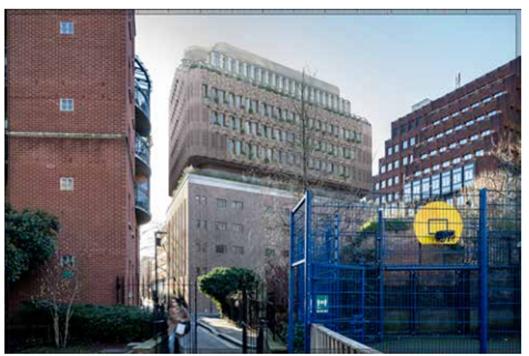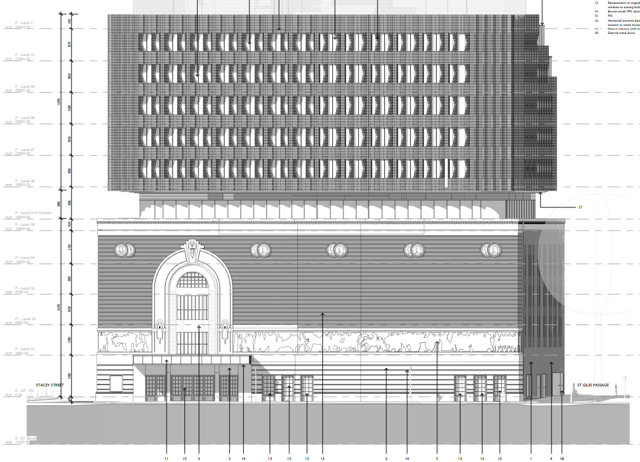Keep the Light Campaign


Members and supporters of The Phoenix Garden object strongly to the proposal by Yoo Capital to redevelop the Odeon, 135 Shaftesbury Avenue, into a towering 200 bedroom hotel as the proposal will pose a significant threat to the sustainability of our community garden.
The proposed construction, threatens to overshadow our cherished green space and raises profound concerns among our community members. Our community garden, a sanctuary of tranquility and growth, serves as a vital communal hub fostering social interaction, sustainability, and well-being. However, the looming threat of this towering development threatens to cast a shadow not only on our garden but also on the spirit and vitality of our community.
In cooperation with other local community groups, our members will be campaigning against this application by raising awareness, engaging in direct lobbying, and collaborating on legal challenges to ensure that the concerns and interests of our community are heard and respected.
Click here to see a month by month analysis of the reduction in sunlight caused by the proposed development.
Below is the statement we submitted to the London Borough of Camden Planning Department highlighting how we believe the planning application contravenes Camden’s policies.
Policy A1 Managing the Impact of Development Phoenix Garden serves local communities seeking connection and respite from high density, overcrowded accommodation and an area already in England’s 7% most deprived for green spaces & quality of living environment (Indices of Deprivation, 2019). This multi-year construction, with its noise, air & traffic pollution, plus a permanent reduction in sunlight and daylight once finished, will leave the Garden barely unusable for local people. Thus, we question if the proposal balances the needs of development with the needs and characteristics of local areas and communities, or exacerbates pre-existing, entrenched and nationally significant local deprivation.
Policy A2 Open Space People, especially from more disadvantaged communities, who live in places with rich green infrastructure tend to be happier, healthier and live longer lives (‘Parks for Health Strategy’)
– Access to high quality parks/ green spaces is associated with better health outcomes overall;
– Regular use of green space is associated with a 43% lower risk of poor general health and 40% are less likely to be overweight or obese;
– Parks access associated with increased physical activity: people with access to a park are 20% less at risk of physical inactivity & 24% more likely to meet physical activity recommendations;
– Access to parks associated with improved mental health and wellbeing… each additional use of any natural environment per week is associated with 6% lower risk of poor mental health.
Despite these known benefits, the proposal’s construction & implementation will damage existing green infrastructure, seeing local communities denied access to community activities which promote physical activity, the mental wellbeing benefits of experiencing nature and opportunities for social connection. Clearly this proposal is detrimental to the setting of designated open spaces and fails to protect non- designated spaces with nature conservation, townscape and amenity value, including gardens.
Policy A3 Biodiversity The overshadowing effect of this proposal jeopardises Phoenix Garden’s delicate biodiversity balance, denying direct sunlight to over 60% of the Garden and disrupting habitats of vital pollinators, insects and wildlife. YOO Capital’s Ecology Report estates that the proposal has “a zone of influence which encompasses the Phoenix Garden” – directly connected to the “changes to the height” of the Odeon building to ecological impact on our ‘Site of Importance for Nature Conservation’. This report sees the resulting reduction in light having a “differential effect”, delaying “leaf and flower development, a shortening of the flowering season and, at the extreme end, a potential loss of some species”, on the “varied nature of habitat with the Phoenix Garden”, especially for “exotic species, such as tree echium”. The significant increase in shade across the year risks a reduction in “the availability of nectar and pollen for invertebrates”. With “15 bee species”, this clearly has a damaging impact on ecological sustainability.
Of particular concern is the proposal’s impact on bats, with Report monitoring showing that “bats use this habitat for regular foraging and social activity”, whilst echolocation calls indicate “the garden to be bat breeding territory”. Finally, the report evidenced bat calls at a peak frequency of 39 khz, characteristic of the Nathusius pipistrelle, designated as a rare species in the UK.
Despite listing the proximity of Phoenix Garden as a key ecological issue, as a site of local importance for nature conservation and a foraging, socialisation & breeding habitat for bats, any mitigation linked to the proposal is “separate to any consideration of offsite impacts”. Interpreting this, any gains from this proposal do not counterbalance the significant and unrecoverable negative impacts on the Garden. Therefore, we question how this proposal supports Camden Council to protect and enhance sites of nature conservation and biodiversity, including gardens wherever possible. YOO Capital’s report presents evidence that the proposal will directly or indirectly result in the loss or harm to a designated nature conservation site or adversely affect the status or population of priority habitats or species”.
Policy D1 Design Construction of this proposed structure will have an overbearing impact on the skyline above the Phoenix Garden, creating a sense of enclosure for local communities and Garden users that will be impossible to escape. Covent Garden thrives on the historic and architectural beauty of its buildings, but the proposal adds no design benefits to the area, instead diminishing the current Grade II listed building’s visual charm and character. We challenge whether the proposal respects (or even recognises) local context and character, preserves or enhances the historic environment and heritage assets in accordance with policy or integrates well with the surrounding streets and open spaces.
Policy D2 Heritage We support Historic England’s objection regarding how the proposal will result in loss of or substantial harm to a designated heritage asset, including conservation areas and Listed Buildings. Their objection, alongside the Seven Dials Trust, Covent Garden Community Association and our own, indicates limited public benefit, which does not outweigh the substantial harm or irreparable loss.
Policy CC2 Adapting to Climate Change Camden & Islington’s ‘Park for Health Strategy’ notes that Parks and a green public realm also provide the habitats and natural ecosystems needed to improve air quality, and to tackle and adapt to the effects of climate change such as heatwaves and flooding. Our Policy A3 response shows risks to the Garden’s fragile ecosystem and the protection of existing green spaces.
We also challenge YOO Capital’s ‘Social Impact Report’ regarding various ‘We Make Camden’ Ambitions.
AMBITION 3: CAMDEN COMMUNITIES SUPPORT GOOD HEALTH, WELLBEING AND CONNECTION FOR EVERYONE SO THAT THEY CAN START WELL, LIVE WELL, AND AGE WELL. YOO Capital make reference to areas that Camden Council suggest partners focus on, including
1. Support people to look after their own health, build on their personal strengths and actively engage in their local communities. YOO Capital refers to work that proposal partners and their supply chain do internally, including the building’s focus on wellbeing for their own staff. However, they fail to address how the health & wellbeing of local communities will be considered. Moreover, they do not recognise or address the proposal’s negative impact on the existing community resource (Phoenix Garden), which, as indicated previously, is already delivering significant positive health benefits for local communities.
2. Take collective action to reduce social isolation and support people to build quality relationships and friendships in the community. YOO Capital makes no reference to reducing social isolation for immediate communities surrounding the Odeon. Again, they fail to concede the ramifications of this proposal on existing work by established community organisations such as the Garden. This lack of awareness, allied to almost no specificity, seen in their “this may include specific partnerships” comment, calls into question whether this is an area that they can be claiming to address. Finally, we fail to see how ‘theatre’ ticket prices ranging from £90 to £120 will serve any other purpose other than to further isolate and exclude local people at a time of economic crisis.
AMBITION 4: CAMDEN SHOULD BE A GREEN, CLEAN, VIBRANT, ACCESSIBLE AND SUSTAINABLE PLACE WITH EVERYONE EMPOWERED TO CONTRIBUTE TO TACKLING THE CLIMATE EMERGENCY. Camden Council’s suggested focus for partners, include
1. Organisations in Camden will embed tackling the climate emergency throughout their operations, building on Camden’s Clean Air Initiatives. According to the London Atmospheric Emissions Inventory 2019 Update (2023), site activities and machinery contribute 4% of London’s total NOxx, 30% of the PM10 and 8% of the PM2.5 emissions (not including supply chain emissions). Thus, in 2019 construction emissions were the largest single source of PM10, equaling 30% of total emissions in London, followed by road transport (27%) and resuspension (15%). In Camden, construction activity is responsible for 4% of NO2 emissions, 24% of PM10 emissions and 9% of PM2.5 emissions. According to the GLA, an estimated 9,500 annual deaths in London are attributable to particulate matter (PM) and nitrogen dioxide (NO2) emissions.
Yoo Capital include Hoare Lea’s Air Quality Assessment in their documentation. Whilst a stakeholder communications plan is referred to, Hoare Lea offer no specificity on its contribution to delivery of the following aspects of Camden’s Air Quality Action Plan, including:
– Ensuring all medium and high-risk sites have real-time particulate monitoring on site and that the information from this monitoring is easily accessible to the public;
– Improving communications with local communities about the pollution impact of large construction projects, how impacts will be minimised, and how residents can report concerns;
– Supporting the development of community-led Neighbourhood Construction Site Watch groups to assist in monitoring construction sites in line with air quality CMP requirements.
Furthermore, there is also no reference at all to how the proposal will deliver:
– Cumulative impact assessments (CIA) for developments in order to identify the impact on local air quality and identify methods to reduce impact on local communities.
Finally, it is unclear how and in what ways the proposal will deliver on
– Ensuring adequate, appropriate, and well located green space and infrastructure is included in new developments (including meeting correct nature conservation standards and the planning process ensuring that new development contributes positively to the surrounding environment).
AMBITION 5: CAMDEN IS A BOROUGH WHERE EVERY CHILD HAS THE BEST START IN LIFE.
Camden Council suggest areas of focus for partners, including
1. Make sure schools, streets, parks, and estates support good health for all children and tackle health inequalities from a young age;
2. Ensure communities work together to support families, parents and children that are more likely to be isolated and experience loneliness.
Similarly to Ambition 3, YOO Capital fails to acknowledge responsibilities around the health or isolation affecting local families, parents and children, or how this proposal will impair current work that takes place, by Phoenix Garden and key community partners who use our space and facilities, to both promote health & wellbeing for local children and reduce the extent to which they are excluded and isolated. The multi-year nature of construction will negatively affect local children’s health in one of two ways. Either they will continue accessing the Garden and be exposed to the site’s harmful emissions, or they will be forced to remove themselves from the Garden, with a detrimental impact on their physical & mental health and feelings of isolation and loneliness. Tokenistic efforts to be seen to address the lack of equality, diversity and inclusion in construction will not offset the wide-ranging impact on local families, parents and children living near the Odeon cinema.
In conclusion, the issues that we have highlighted, when viewed in totality, present an existential threat to the future sustainability of Phoenix Garden. Beyond the significant risks to the fragile environmental ecosystem and degrading of the lives and experiences of local communities, this proposal threatens the financial viability of the Garden. In 2023/ 24, the Phoenix Garden generated £91,452 from commercial hire of the building and garden spaces. The reason for this level of income generation is entirely due to the very nature of a tranquil garden space set in a built up, urban environment. Removal of our ability to be self-financing, both during and beyond the multi-year period of construction, will have a devastating and unsustainable impact on income generation. And the loss of this £91,452 will mean that our free-at-the-point-of-access services for isolated older residents, children and families, volunteering opportunities and lifelong learning for all our local communities will be lost, permanently.
